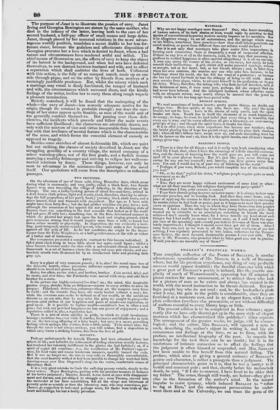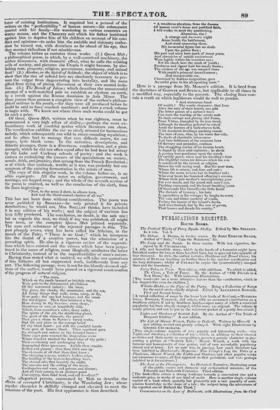SHELLEY'S POETICAL WORKS.
Tins complete collection of the Poems of SHELLEY, is another adventurous speculation of Mr. MoxoN, in a walk of literature where, but for his previous experience, any thing of very profitable success would appear doubtful; the fitnciful character with which a great part of SHELLEY'S poetry is imbued, like the puerile sim- plicity of much of Wanuswounes, appearing but ill adapted to please readers for mere amusement, or to attract those who look for a picture of man as he exists and always has existed in the world, with the moral instruction to be thence deduced, But per- lamps people buy who do not read : and, be the bookseller's profit what it may, the gain to the public is considerable, since they are furnished at a moderate cost, and in an elegant forum, with a com- plete collection (nowhere else procurable, or not without difficulty) of authors essential to every library large or little. The present edition is to be completed in four volumes ; appa- rently (for we have only sheets) got up in the same style of elegant neatness which has characterized this publisher's other reprints. The arrangement of the greater woils, we judge, will be chrono- logical; and the editor, _Mrs. SHELLEY, will append a note to each, describing the author's object in writing it, and his cir- cumstances and feelings at the time, so as to form, with the prefhce an intellectual biography of the poet. As regards her knowledge for the task there can be no doubt ; but it is the misfortune of intimate connexion so to affect the feelings that the judgment is often biassed or suspended, and Mrs. SHELLEY has been unable to free herself from this natural fulling. The preface, which aims at giving a general estimate of SHELLEY'S genius and character, is rather a panegyric than as judgment. The principal characteristic point in it is, that he was a martyr to ill health and constant pain ; and that, shortly before his melancholy death, lie said, " If I die to-morrow, I have lived to be older than my &tiler." The notes, though still wordy, arc better—they give a clue to the formation of time author's mind. In the natural impulse to resist tyranny, which induced SHELLEY to " refuse to fag at Eton," and the subsequent persecutions he under- went there and at the University, we can trace the germ of the
hater of existing institutions. It required but a perusal of the writers on the " perfectibility" of human nature—his subsequent quarrel with his family—his wandering in various countries on scanty means, and the Chancery suit which • his father instituted against him to deprive him of his children on account of his con- duct and opinions—to make him the amiable and visionary enthu- siast he turned out, with doctrines so far ahead of his age, that they seemed ridiculous if not mischievous. The volume before us contains three works. (1.) Queen Mal); a philosophical poem, in which, by a well-contrived machinery, the author denounces, with dramatic effect, what he calls the existing evils of society, and pictures the Utopia it might become, by abo- lishing rent, property, religion, government, matrimony, and animal food ! (2.) Alastor, or the Spirit of Solitude; the object of which is to show that the ties of refined love are absolutely necessary to pre- vent the vulgar from degenerating into brutality, and the more gifted from dying of pining discontent at their own mental isola- tion. (3.) The Revolt qf Islam ; which describes the unsuccessful attempt of a well-matched pair to establish an elysium on earth, by a revolt against the Roman dominion in Asia Minor. The three poems thus present a complete view of the author's philoso- phical notions in his youth,—for they were all produced before he could be said to have reached manhood ; and form a crack volume to begin with. We know not where three such works could be got for such a price. Of these, Queen iWab, written when he was eighteen, must be pronounced a very high effort of ability,—perhaps the most ex- traordinary work of youthful genius which literature can show. The versification exhibits the car so nicely attuned burr harmonious melody, which subsequently ran wild in sweet-sounding mysticism ; and he often had to manage that very difficult .metre, for our tongue, lyric blank verse. In the narrative, descriptions, and didactic passages, there is a directness, condensation, and a plain strength, which he did not often equal after he had been led astray by the Lake and Cockney schools of poetry : and the work is curious as embodying the essence of the speculations on society, morals, faith, and.practice, that sprang from the French Revolution ; or of which that outbreak, terrific as it was, was probably but one symptom of the existing fermentation in the minds of men. The copy of this singular work, in the volume before us, is an editio expurgate?. All the notes on religion, government, and
marriage, are lopped away; and the whole of the seventh section of the poem is omitted, as well as the conclusion of the sixth, from the lines beginning—
"Now, to the scene I show, in silence turn,
And read the blood-stained charter of all wo."
This has not been done without consideration. The poem was never published by Siismuly—he only printed it for private distribution ; he would not, Mrs. SHELLEY thinks, have included it in any edition of his works; and the subject of excision has ker, folly pondered, The conclusion, no doubt, is the safe one; but as regards the text, we think if any was published, all might have been, or the complete Queen Mob printed separately. The sum and substance of the rejected passages is this. The poet plumply avows, what has been called his Atheism, in the speech of the Fairy, " There is no God ; " which he interprets into the denial of a creative power, but the admission of a pervading spirit. He also in a vigorous review of the supersti- tions which have existed and the crimes which have been perpe- trated in the name of religion, most illogically attributes the latter to Christianity, instead of to the insperfectibility of man's nature.
Having thus stated what is omitted, we will take our quotations of this hitherto all but suppressed work, indifferently from any part. The following passage, were it not for the bluntly-avowed opi- nions of the author, would have passed as a vigorous condensation of the progress of natural reNrion.
. . . . " The stars,
Which on thy cradle beamed so brightly sweet, Were gods to the distempered pinyfidness Of thy untutored billowy : the trees, The grass, the clouds, the mountains, and the sea, All living things that walk, swim, creep, or fly, Were gods : the sun had homage, and the moon lice worshipper. Then thou becamest a boy, More daring in thy frenzies: every slope, Monstrous or vast, or beautifully wild,
Which, from sensation's relics, limey culls' •
The spirits of the air, the shuddering ghost, • The genii of the elements, the powers That give a slope to Nature's varied works, Had life and place in the corrnpt belief Of thy blind heart : yet still thy youthful hands Were pure of human blood. Then manhood gave Its strength and ardour to thy frenzied brain : Thine eager gaze scanned the stupendous scene Whose wonders mocked the knowledge of thy pride : Their everlasting and unchanging laws Reproached thine ignorance. Awhile thou stoodst, Battled and gloomy : then thou didst sum up The elements of all that thou didst know ; The changing seasons, winter's leafless reign, The Imamg of the heaven-breathing trees, The eternal orbs that beautify the night, The sun-rise and the setting of the moon, Earthquakes and wars, and poisons and disease; And all their causes, to an abstract point Converging, thou didst bend, and call it—Con!"
The allegorical person, summoned by Mab to describe the effects of corrupted Christianity, is the Wandering Jew ; whose
popular character is skilfully changed and elevated to meet the
occasions of the poet. His first appearance is thus described. " A wondrous phantom, from the dreams Of human'error's dense and purblind faith, I Will evoke, to meet thy questioning. Ahasuerus, rise !
A strange and wo-worn wight Arose beside the battlement, And stood unmoving there.
His inessential figure cast no shade Upon the golden floor; His port and mien bore mark of many years, And chronicles of untold ancientness Were legible within his beamless eye ; Yet his cheek bore the mark of youth; Freshness and vigour knit his manly frame ; The wisdom of old age was mingled, there With youth's primeval dauntlessness ; And inexpressible wo, Chastened by fearless resignation, gave An awful grace to his all-speaking brow."
Here is a passage from Mr. MoxoN's edition. It is bred from. the doctrines of GODWIN and SPENCE, but applicable to all times in a modified way, especially to the present. The closing lines con- tain a truth on which legislators would do well to ponder.
" And statesmen boast Of wealth ! The wordy eloquence, that lives After the ruin of their hearts, can gild The bitter poison of a nation's wo- Can turn the worship of the servile mob To their corrupt and glaring idol Fame, From Virtue, trampled by its iron tread, Although its dazzling pedestal be raised Amid the horrors of a limb-strewn field, With desolated dwellings smoking round. The man of ease, who, by his warm fire-side, To deeds of charitable intercourse And bare fulfilment of the common laws Of decency and prejudice, confines The struggling nature of his human heart, Is duped by their cold sophistry ; he sheds A passing tear perchance upon the wreck Of earthlypeace, when near his dwelling's door The frightful waves are driven—when his sun h murdered by the tyrant, or religion
Drives his wife raving mad. But the poor man,
Whose life is misery, and fear, and care ; Whom the morn wakens but to fruitless toil; Who ever hears his famished offspring's scream, Whom their pale mother's uncomplaining gaze For ever meets, and the proud rich man's eye, Flashing command, and the heart-breaking scene Of thousands like himself,—lie little heeds The rhetoric of tyranny ; his hate Is quenchless as his wrongs ; he laughs to scorn The vain and bitter mockery of words, Feeling the horror of the tyrant's deeds, And unrestrained, but by the arm of power, That knows and dreads his enmity."



























 Previous page
Previous page